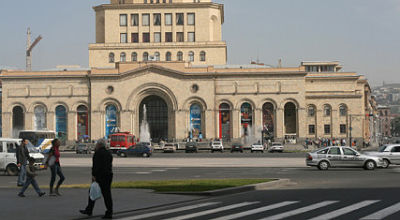Sarkiss Rshdouni escaped the fighting in the besieged Syrian city of Aleppo months ago but cannot shake memories of what he witnessed.
“I was with a friend when I heard gunshots,” said Rshdouni, who is among hundreds of thousands of people who have fled the war in his homeland. “It was fast—second by second, the sound was getting closer. I saw mass shooting, people running.”
Aleppo is home to more than 80 percent of Syria’s Armenian community, and those who are still there remain at the center of the battle for control of the country.
Syrian rebels recently pushed back army defenses and moved closer to the country’s second-largest airport just outside Aleppo. The airport stopped commercial flights weeks ago because of the fighting, but it is used by Syrian President Bashar Assad’s military to resupply troops and launch airstrikes against rebel positions.
The uprising against Assad, which erupted nearly two years ago, has left more than 2 million people internally displaced and pushed 650,000 more to seek refuge abroad in Turkey, Lebanon and Jordan.
Aleppo, Syria’s largest city, has been engulfed in fighting for months between government forces and opposition militias, including al-Qaida-allied extremists. People there are dealing with shortages of food, medicine and electricity during the coldest winter in the Middle East in two decades.
The Christian-Armenian community in Syria is relatively small—between 60,000 and 100,000 people, according to estimates—but its history has added to its unease. Armenians in Syria are descendants of people who fled to Syria after escaping a genocide against Armenians in Ottoman Turkey during World War I.
Many worry the same can happen in Syria, where the Christian Armenians are again at the mercy of Muslim factions at war, and they are desperate to get out.
“Syrian Air has rerouted all flights because of the conflict in Aleppo,” said Gevorg Abrahamyan, press secretary of Zvartonts International Airport in Armenia. “There’s a flight arriving once a week now from Latakia (in Syria) to Yerevan.”
Upon arrival in the capital city of Yerevan, they still face a struggle. Armenia is a former Soviet republic that’s landlocked by Turkey, Georgia and Iran. Unemployment is estimated at 20 percent, according to the International Monetary Fund.
“Syrian Armenians are arriving every week,” said Firdus Zakarian, chief of staff at the Armenian Ministry of Diaspora’s commission for Syrian-Armenian issues. “It is hard for Armenia. We do not have the strongest economy, but we are trying to do everything we can so they don’t feel more pain.”
To date, the Ministry of Diaspora estimates that more than 7,000 Armenian Christians have arrived in Armenia from Syria since the start of the conflict.
Armenian authorities are trying to find ways to speed the exit from Syria and make the adjustment to life here easier. The authorities have simplified the visa process out of Syria. Elementary schools have been established that teach classes in the Arabic language that Syrian-Armenian children have grown up with, according to a familiar Syrian curriculum.
One such school is the Cilician School funded by a charitable organization and the Ministry of Education and the Ministry of Diaspora in Armenia. There are 300 students and 16 new teachers, all of whom lost their jobs in Syria.
“It was difficult for them at first, but they are now slowly adapting to their new lives,” said Nora Pilibosian, director of the Cilician School in Yerevan. “Of course they miss their homes, their relatives and their toys, but they are adjusting.”
While many new arrivals are finding housing in the capital, a small minority of the Armenians fleeing the conflict in Syria have become settlers in the breakaway southern Caucasus region of Nagorno-Karabakh.
Vartan Boghossian, 30, left Syria with his family in September for Nagorno-Karabakh. He lives in communal housing, sharing a kitchen and a bathroom with five families.
Boghossian says it was his dream to come to Armenia, but now he faces the challenge of rebuilding his life.
“I want to stay here,” said Boghossian, who took his citizenship exam last summer. “Life is difficult here. There are few jobs and everything is expensive. But I want to find extra work to help me stay and live normally.”
Neighboring Azerbaijan claims Nagorno-Karabakh as its territory and it has issued an official note of protest to Armenia about refugees settling in the disputed region.
Many of the refugees planned to stay in Armenia for a few months, but some now think they may never get back home.
“It is not the same Syria anymore,” says Rshdouni, who is among the few refugees who has found work. “To watch my people killed, the city’s destruction. I can’t even imagine this.”












































